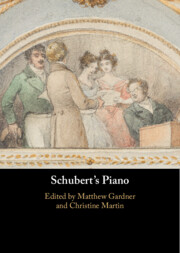Book contents
- Schubert’s Piano
- Schubert’s Piano
- Copyright page
- Contents
- Figures
- Tables
- Music Examples
- Notes on Contributors
- Acknowledgements
- Abbreviations and Conventions
- Introduction
- Part I The Piano in Schubert’s World
- Part II Instruments and Performance
- Part III Sound and Musical Imagery
- Part IV Understanding Schubert’s Writing for the Piano
- 12 Schubert and the Style Brillant: Variation and Figuration in Schubert’s Concertante Chamber Music with Piano
- 13 Rethinking Development and Variation in Schubert’s Last Piano Sonatas: What Do the Drafts and Final Versions Reveal?
- 14 Reflections and Echoes in Schubert’s Waltzes
- 15 ‘Schubert Would Have No Objection if He Knew about It’: Franz Liszt’s Reception of Schubert’s Music
- Select Bibliography
- Index
15 - ‘Schubert Would Have No Objection if He Knew about It’: Franz Liszt’s Reception of Schubert’s Music
from Part IV - Understanding Schubert’s Writing for the Piano
Published online by Cambridge University Press: aN Invalid Date NaN
- Schubert’s Piano
- Schubert’s Piano
- Copyright page
- Contents
- Figures
- Tables
- Music Examples
- Notes on Contributors
- Acknowledgements
- Abbreviations and Conventions
- Introduction
- Part I The Piano in Schubert’s World
- Part II Instruments and Performance
- Part III Sound and Musical Imagery
- Part IV Understanding Schubert’s Writing for the Piano
- 12 Schubert and the Style Brillant: Variation and Figuration in Schubert’s Concertante Chamber Music with Piano
- 13 Rethinking Development and Variation in Schubert’s Last Piano Sonatas: What Do the Drafts and Final Versions Reveal?
- 14 Reflections and Echoes in Schubert’s Waltzes
- 15 ‘Schubert Would Have No Objection if He Knew about It’: Franz Liszt’s Reception of Schubert’s Music
- Select Bibliography
- Index
Summary
In spring 1838, Franz Liszt made his first appearances before the Viennese public with a selection of his transcriptions of Schubert’s Lieder for pianoforte. The performances unleashed veritable storms of applause from audiences and critics alike; some of the rapturous reviews even claimed that the music of Schubert, who had died ten years earlier, only became intelligible through Liszt’s playing. Liszt’s transcriptions were meant to transfer Schubert’s piano writing effectively to the new generation of concert grands. Their formidable virtuosity, which was frequently criticised in later years, was only superficially an end in itself, however. Instead, Liszt viewed virtuosity as a vehicle for obtaining the maximum expression appropriate to the original and for capturing the emotive quality of Schubert’s music. His precepts as an editor of Schubert’s piano music were of a different nature. Unlike contemporary editions, the Schubert volumes that Liszt prepared for the Stuttgart publishing house Cotta around 1870 are exemplary in quality and indicate every editorial intervention, while also being devoid of the arbitrary additions common to the subjectively tinged performance tradition of his generation. This chapter provides a thorough study of Liszt’s approach to Schubert’s music, while also considering the reception of his adaptations and editions.
- Type
- Chapter
- Information
- Schubert's Piano , pp. 301 - 323Publisher: Cambridge University PressPrint publication year: 2024



